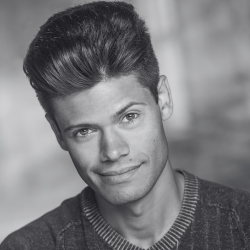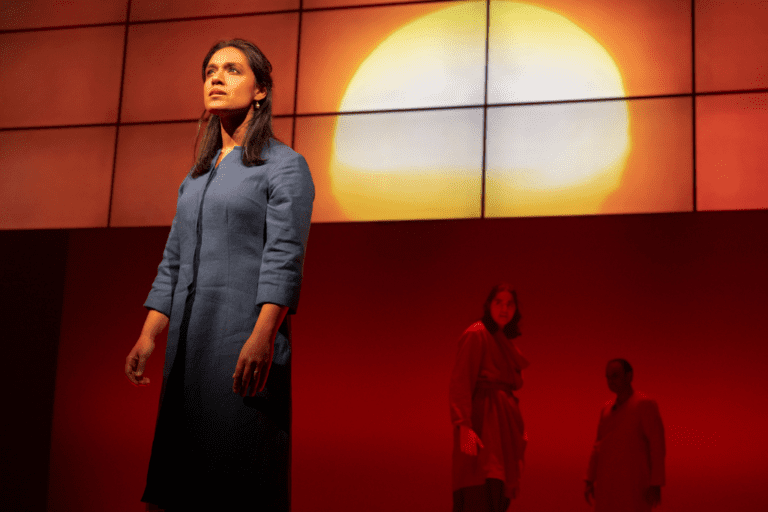A York University symposium is inviting artists and scholars to discuss strategies for combatting repression
In a world where fascism’s back in fashion, how can theatre prepare — and resist?
That’s the subject of Facing Backlash: Performance in the Age of Reactionary Politics, a symposium taking place April 27 and 28 at York University’s Joseph G. Green Theatre. The event is the culmination of a five-year initiative called (Re)Setting the Stage: The Past, Present, and Future of Casting Practices in Canada. Associated projects include a podcast called Shaking Up Shakespeare and an issue of Canadian Theatre Review on casting and race.
The curatorial team for the symposium consists of York University faculty and a mix of graduate and undergraduate students (many of whom are working theatre artists): Courtney Ch’ng Lancaster, Laura Levin, Keira Loughran, Mariló Nuñez, Jamie Robinson, and Marlis Schweitzer, with support from Maya Fleming, Celine Daaboul, and Natasha Ross. Speakers will include Canadian artistic leaders such as Philip Akin, Carmen Alvis, Kimberley Rampersad, and Mumbi Tindyebwa Otu, as well as the American performance artist Karen Finley.
Both days of Facing Backlash are free for anyone to attend, either in-person or virtually. (Registration is required.) For those unable to attend either format, members of 2023’s IBPOC Critics Lab will be covering the event live on Intermission’s Instagram story.
“Subconsciously, I feel that we’ve been planning this since 2020,” said Robinson in an interview. In the summer of that year, when George Floyd’s murder sparked global protests, he remembered “sitting there and thinking, it’s all going to turn around again. This is a pendulum… It happened in 2016. It happened before that… So we knew this was going to be the conversation five years later.”
In the same interview, Schweitzer remembered how, in 2020, a colleague had described work in DEDI — decolonizing, equity, diversity, and inclusion — as “‘a marathon.’
“This is not instantaneous. There will be a backlash, as Jamie said, and that’s going to come back fierce, because white supremacy is intense.”
As an example, Schweitzer noted the online vitriol that Ottawa’s National Arts Centre (NAC) faced in 2023 during the run of Aleshea Harris’ play Is God Is, when they announced one performance as a Black Out night — a night specifically reserved for Black audience members to experience Black-led theatre in community. “They’re intended as a gesture of welcome rather than a gesture of exclusion,” said Schweitzer. “But it was interpreted [by some] using the language of reverse racism.”
Schweitzer also mentioned “anecdotes [I’ve been hearing], about pushback against ‘another Indigenous play’ or ‘another play by an artist of colour,’” from subscribers at various theatres, “that’s coming from, as I understand it, a white middle-class audience.”
Nuñez pointed out that the seeds of backlash exist in Canadian theatre’s origins. “I think the fundamental issue is that the foundation of inequity is still intact,” she said. “If you think about when Canadian theatre was first established, the theatre we were watching and learning about was Eurocentric, Western theatre… We place everything against that [perceived] ideal. Until that changes, I don’t think we can really make a change.”
With this context in mind, the symposium will address “what’s happening, and what are the strategies that people are finding useful now” to combat backlash, said Schweitzer, as well as “previous experiences of backlash” in Canada and the United States. “It’s not as though it’s the first time this reaction to progressive, anti-colonial, anti-racist tactics has happened,” she noted. “What can we do about it?”
The event will acknowledge the real strides IBPOC theatre artists and scholars have made. “So much of the change that’s been happening within institutions is because of people like Jamie and Marilo,” said Schweitzer, who is white. “In our theatres in Toronto, we have [IBPOC artistic directors] like Weyni Mengesha, Mel Hague, Herbie Barnes, Mike Payette. We have the Why Not Theatre team that’s taking [their production] Mahabharata around the world. [And in Ottawa,] we have Nina Lee Aquino as the director of the NAC’s English Theatre.” Facing Backlash will include panels on leadership, IBPOC artists in academia, disability justice, and gender-based discrimination, as well as intergenerational conversations about past and present strategies to combat white supremacy.
Although the symposium will focus on Canada, “we have one American coming who has a lot to say on this topic,” said Schweitzer: “Karen Finley, who is a performance artist, and most famous as one of the NEA Four.” In 1990, Finley and three other artists sued the National Endowment for the Arts for revoking their grant funding, based on “what conservative politicians understood as the deviancy of [their] performance art,” Schweitzer explained. “That was an earlier example of culture wars. It’ll be an interesting opportunity to think across borders, and learn from someone who’s experienced [backlash] in a different geographic and political context.”
Speaking of the U.S., Schweitzer stressed “the incredible privilege we have” in Canada right now. With academic freedom at institutions like Columbia and Harvard under threat from the Trump administration, in Canada “we have an ability to speak in a way that some of our U.S. colleagues now, as well as colleagues around the world, [do not.] I think recognizing what we have and not wasting that opportunity is important.”
What are some concrete strategies to combat backlash in the here and now? Nuñez stressed the importance of theatre training that supports minoritized artists. “When I was in theatre school, there were no teachers that were racialized, or from a minority group, or culturally specific,” said Nuñez. Now, as an educator, “I’ve had students say to me, ‘I’ve never had a teacher who’s Latina, who’s talking about decolonization.’”
When it comes to emerging playwrights, “I think the younger generations are starting to see [fewer] white authors and more authors of colour in their classrooms,” Nuñez said.“The more you normalize that… and disengage from that idea of [European] exceptionality, you open up to a more global perspective about what is good writing. I think it’ll just become about what is a good story.”
Robinson agreed. “When I teach theatre, there is an openness to decolonizing,” he said. “There is an openness to having those discussions with students, who are really excited about the work. There’s not much backlash happening there.”
And what to do about those subscribers rankled by “another IBPOC play”?
“We just flood them with more ,” urged Robinson. “My hope and my dream is that in five years time, these stories are just theatre stories, because we’ve had this golden era of IBPOC Canadian plays. One of the research projects that I’m working on right now is consulting with Studio 58 in Vancouver, which is creating this massive database of IBOC plays written by mostly Canadian [playwrights] that can help theatres and schools.
“We need a new canon here in Canada,” he concluded. “That’s my goal.”
Facing Backlash takes place on April 27 and 28 at York University’s Joseph G. Green Theatre. You can register for the in-person symposium or the livestream here.
York University is an Intermission partner. Learn more about Intermission’s partnership model here.













Comments